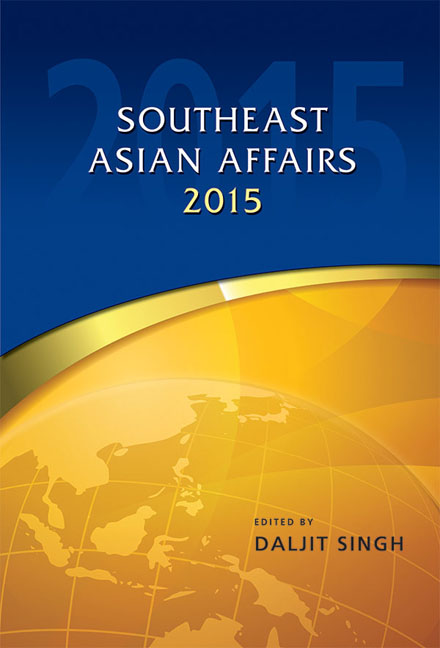Book contents
- Frontmatter
- Contents
- Foreword
- Introduction
- Acknowledgements
- THE REGION
- BRUNEI DARUSSALAM
- CAMBODIA
- INDONESIA
- LAOS
- MALAYSIA
- MYANMAR
- THE PHILIPPINES
- SINGAPORE
- Singapore in 2014: Managing Domestic and Regional Concerns and Signalling a New Regional Role
- Managing Cyberspace: State Regulation versus Self-Regulation
- THAILAND
- TIMOR-LESTE
- VIETNAM
Singapore in 2014: Managing Domestic and Regional Concerns and Signalling a New Regional Role
from SINGAPORE
Published online by Cambridge University Press: 19 May 2017
- Frontmatter
- Contents
- Foreword
- Introduction
- Acknowledgements
- THE REGION
- BRUNEI DARUSSALAM
- CAMBODIA
- INDONESIA
- LAOS
- MALAYSIA
- MYANMAR
- THE PHILIPPINES
- SINGAPORE
- Singapore in 2014: Managing Domestic and Regional Concerns and Signalling a New Regional Role
- Managing Cyberspace: State Regulation versus Self-Regulation
- THAILAND
- TIMOR-LESTE
- VIETNAM
Summary
In 2014 the government made a number of new political appointments and signalled that it was preparing the country for the fourth generation political leadership. It also acted on concerns about the cost of housing and medical fees, especially for the older pioneer generation that had helped build Singapore. In regional relations there were a few hiccups with Malaysia over toll charges for vehicles crossing the common causeway and unhappiness with the Indonesian decision to name a warship after two Indonesian marines who were tried and executed in Singapore for a terrorist act during Indonesia's Confrontation against Malaysia. Singapore also initiated a number of ventures that appear to signal a greater leadership role in arbitration and disaster management.
Political and Legal Developments
In domestic politics the most significant development was the PAP government's announcement in April that two members of the Cabinet had been made full ministers. They are Tan Chuan Jin who was made Manpower Minister, and Lawrence Wong who was made Minister for Culture, Community and Youth. The government announced that together with two other earlier appointees — Education Minister Heng Swee Keat and Social and Family Development Minister Chan Chun Sing, the appointments also reflected future priorities for the government during an important period of transition that will require emphasis on social and manpower issues. These appointments appear to have consolidated a group of younger ministers who are likely to be identified with a fourth generation leadership. Importantly, Tan Chuan Jin and Chan Chun Sing's appointments are well in line with having a core pool of Singapore Armed Forces (SAF) scholars within the Cabinet. The current pool also includes Prime Minister Lee Hsien Loong, Deputy Prime Minister Teo Chee Hean and Trade and Industry Minister Lim Hng Kiang.
In other political news, former presidential candidate Tan Jee Say announced the formation of a new political party called “Singaporeans First”. It is likely that this development is closely related to seemingly high levels of dissatisfaction among locals with the high percentage of foreigners in the domestic population. There are constant complaints among locals that infrastructure facilities and services are being stretched on account of the new arrivals. Additionally, there is also a segment within the population that regards foreigners as responsible for taking away jobs from the locals.
- Type
- Chapter
- Information
- Southeast Asian Affairs 2015 , pp. 305 - 320Publisher: ISEAS–Yusof Ishak InstitutePrint publication year: 2015

